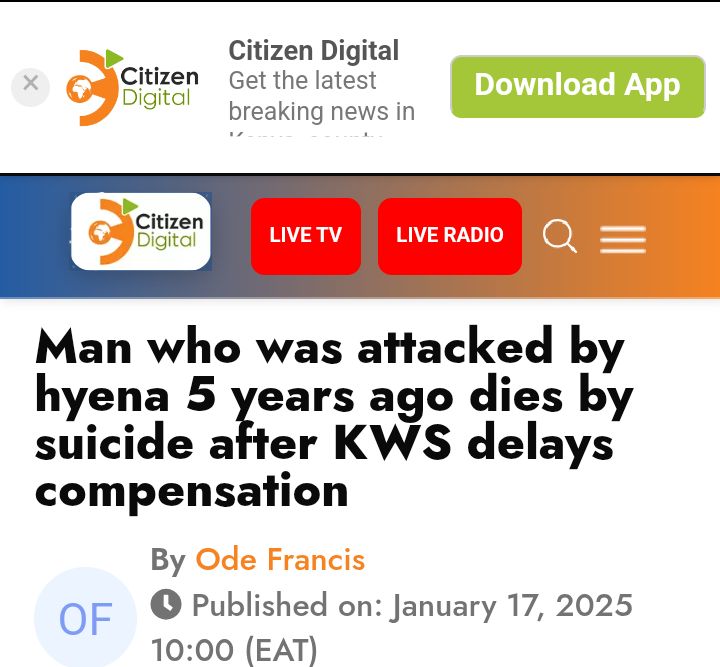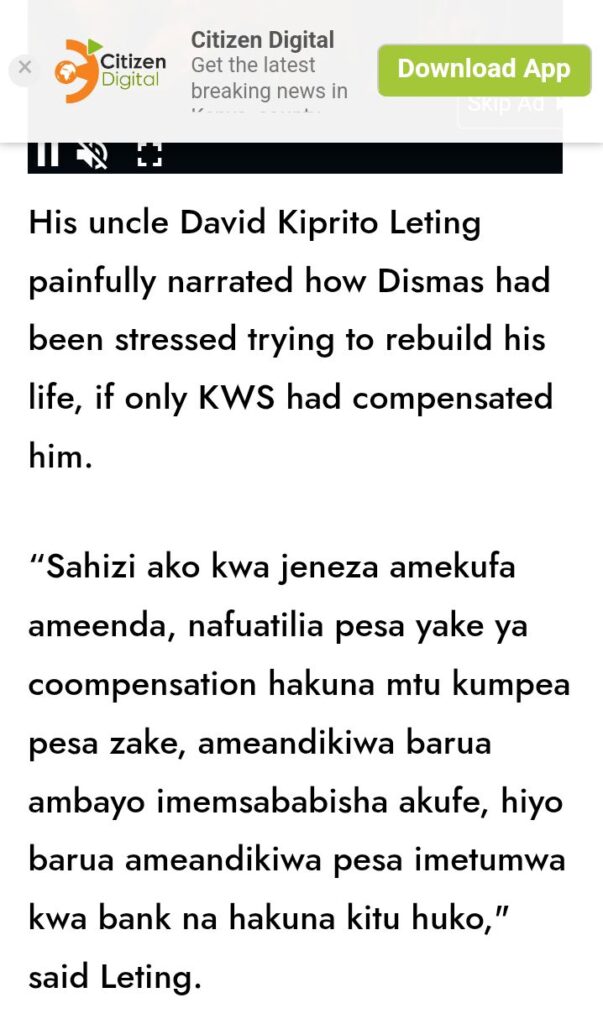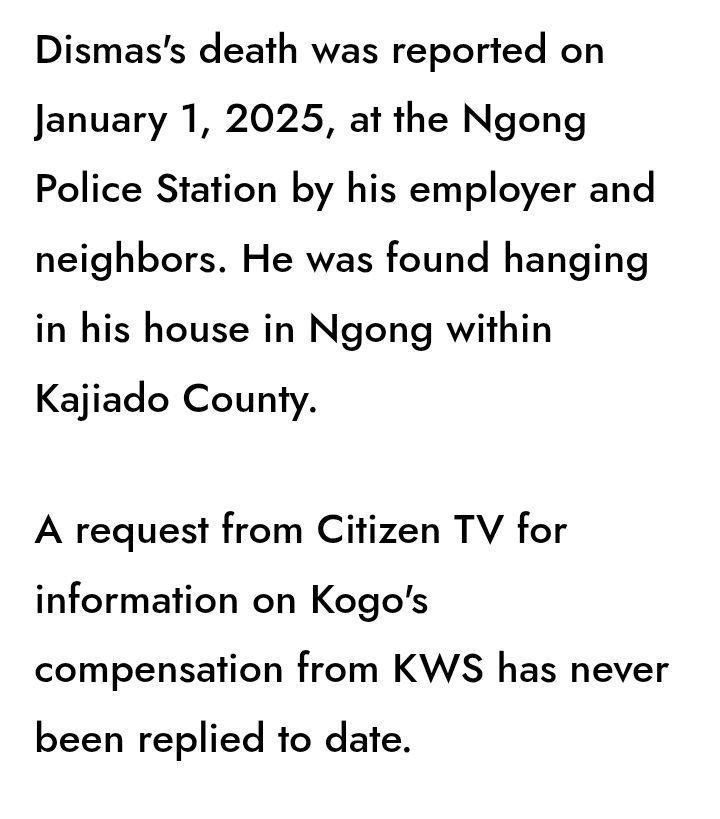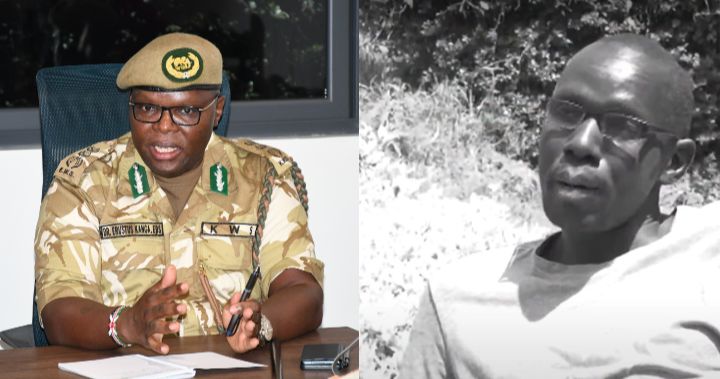In December 2024, Citizen TV shared the story of Dismas Kogo, a security guard from Ngong, Kenya, who had been attacked by a hyena five years earlier.
This attack led to the loss of one of his fingers and caused severe injuries to his leg.

According to Citizen TV, Following the incident, Dismas sought compensation from the Kenya Wildlife Service (KWS), but his efforts were unsuccessful.
During the interview, he expressed deep frustration, explaining how the attack had disrupted his plans to join the army and imposed financial burden on his family.
He shared that his parents had to sell their possessions to cover his medical expenses, and the lack of compensation left him feeling hopeless about his future.
Tragically, on January 1, 2025, Dismas was found dead in his home, having taken his own life.
His uncle, David Kiprito Leting, spoke about the immense stress Dismas had been under while trying to rebuild his life without the compensation he believed he was owed.

Leting revealed that Dismas had received a letter indicating that compensation funds had been sent to his bank, but when he checked, there were no funds available.
This situation added to Dismas’s despair, leading to his untimely death.
The Kenya Wildlife Service is responsible for compensating victims of human-wildlife conflicts.

For example, in April 2023, KWS allocated Sh196 million to 609 victims in Kajiado County, with each family that lost a member receiving Sh5 million.
Despite these efforts, there have been concerns about delays and inconsistencies in the compensation process.
In November 2024, the government released Sh569 million to settle claims filed up to 2017, acknowledging a backlog of over 13,000 claims.
Dismas’s case highlights the challenges faced by victims awaiting compensation.
The emotional and financial toll of such incidents is profound, and delays in compensation can worsen the suffering of victims and their families.
In Kenya, human-wildlife conflict is a issue, especially in areas bordering national parks and wildlife reserves.
Communities living near these areas often face threats to their lives, property, and livelihoods due to wildlife encounters.
However, the effectiveness of these mechanisms has been questioned due to delays and bureaucratic challenges.
For instance, in February 2022, it was reported that KWS owed victims of human-wildlife conflict Sh2.6 billion in unpaid compensation claims.
Out of these arrears, only Sh606 million had been budgeted for the next financial year, indicating that many victims would have to wait longer for compensation.
Some of these pending bills dated back to the financial year 2017/2018.
In November 2023, two senior KWS officials were slated for prosecution over the irregular procurement of uniforms, a scandal estimated to have cost taxpayers Sh11.5 million.
The Director of Public Prosecutions approved charges against these officials for awarding a direct procurement contract without adhering to proper procedures.
Such incidents of alleged corruption within KWS leadership raise concerns about the organization’s commitment to transparency and accountability.
Furthermore, internal conflicts within KWS have surfaced, affecting its operations. In his initial months as Director-General, Erastus Kanga has displayed incompetence and in his leadership calling for change in KWS top leadership.
These internal challenges can hinder KWS’s ability to effectively manage wildlife conservation and address human-wildlife conflicts.
The combination of delayed compensations, allegations of corruption, and internal conflicts within KWS calls the need for comprehensive reforms.
The tragic case of Dismas Kogo, coupled with internal scandals and leadership challenges, highlights the urgent need for reforms within KWS.
The leadership of KWS under Director-General Erastus Kanga has been marred by allegations of corruption, inefficiency, and insensitivity to the plight of victims of human-wildlife conflict.
Despite being tasked with safeguarding wildlife and compensating affected communities, his tenure has been characterized by delays in compensation claims, as seen in the tragic case of Dismas Kogo, who took his own life after years of unfulfilled promises.
Moreover, scandals such as the irregular procurement of uniforms costing taxpayers Sh11.5 million and internal conflicts, including the interdiction of senior managers, point to a leadership riddled with mismanagement and lack of accountability.
These failures have not only damaged public trust in KWS but also jeopardized the agency’s critical role in wildlife conservation and community relations.





















Add Comment